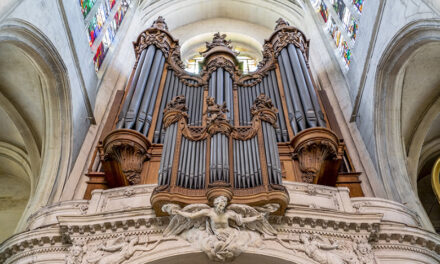The eighteen string players who are the Sphinx Virtuosi walked onto the Watson Hall stage and launched into the 2020 composition Ev’ry Voice by Xavier Foley (b. 1994). With amazing clarity and virtuosity, the ensemble wowed the nice-sized masked audience the entire evening. This ensemble plays with incredible precision without the aid of a conductor; the entire ensemble (with the exception of the celli and double basses) stood throughout the concert.
The group, founded in 2004, and consisting of “the nation’s top Black and Latinx classical soloists,” calls itself “the most diverse professional chamber orchestra in the country.” It was founded under the umbrella of the Sphinx Organization, a Detroit-based group created by Aaron Dworkin, now a Professor at the University of Michigan. According to the program notes, “Sphinx works to create positive change in the arts field and in communities across the country . . . “
Ev’ry Voice was written as an homage to the Black National Anthem, “Lift Every Voice and Sing.” Strains of the anthem float through the ensemble in a type of variation form, with some jazz and blues riffs. The composition ends with a brilliant unison flourish impeccably brought off by the orchestra.
The concert, entitled “Tracing Visions,” “sets out to challenge and evolve our ‘classical’ canon by illumining a new pathway for listening, sharing, and artistic expression.” Indeed, the entire performance traveled through mostly unfamiliar literature with energy and excitement.
Next up was an arrangement of the gentle Andante cantabile movement from the String Quartet No. 2 in A minor (1935) by Florence Price (1887-1953). The tunes slowly unfolded with a warm glow. The work is infused with snippets of spirituals, like “Motherless Child” and “Swing Low.”
Two movements from Four Novelletten (1903) by Samuel Coleridge-Taylor (1875-1912) followed. The sound of a triangle and tambourine enlivened the Allegro moderato. A swirling waltz bookends a more lyric middle section. The ethereal Andante con moto features a wailing solo violin line impeccably played by concertmistress Patricia Quintero. Faster-paced sections with percussion provided wonderful contrasts.
The first half of the concert concluded with Banner for quartet and string orchestra (2014, rev. 2017) by Jessie Montgomery (b. 1981). The quartet was comprised of Sphinx Virtuosi’s principals: Patricia Quintero and Meredith Riley (violins), Celia Hatton (viola), and Thomas Mesa (cello).
According to the composer, the work “is a tribute to the 200th anniversary of ‘The Star-Spangled Banner,'” and attempts to answer the question, “What does an anthem for the 21st century sound like in today’s multi-cultural environment?” The energetic performance featured the basses rapping on their instruments as well as glissando string playing in the arresting middle section. Sometimes the work bordered on chaos, but also had mournful passages; all were passionately played by the ensemble.
Seven for solo cello (2020) by Andrea Casarrubios (b. 1988) was commissioned and performed by Thomas Mesa, who gave some introductory remarks. He explained that the work was written in the middle of the Covid-19 pandemic as a tribute to the essential workers. The title comes from “New York City’s daily 7PM tribute . . . the moment when New Yorkers clapped from their windows connecting with each other and expressing appreciation for those on the front lines.”
This is a powerful, dramatic work with plaintive tunes. Especially interesting and impressive were low-note pizzicatos that accompanied the soulful outpourings. Mesa gave a heart-felt reading, and appropriate silence filled the hall at the conclusion.
The upbeat Inocente and Mourinho (2018) by Ricardo Herz (b. 1978) brought Latin rhythms to the fore. A pizzicato accompaniment (which sometimes broke into knocking on the instruments) provides a backdrop for the solo violin which presents a somewhat soulful sound. The second piece is similar, except the solo was more of a fiddling romp. Both teemed with energy and were great fun.
Speaking of furious fiddling—the printed program concluded with the final movement from the Concerto for Strings, Op. 34 (1965) by Alberto Ginastera (1916-1983). As the tempo marking Finale furioso indicates, this is nothing short of a fiddle fest, but less dance-like and more wild – vital rhythm was the name of the game.
The audience roared its approval and leapt to its feet. The crowd was treated to an unannounced raucous encore. The entire concert was a testament to contemporary composition and to the dynamism of the Sphinx Virtuosi.
This program repeats Friday, October 8 at UNC Greensboro. You can see our full calendar for details.












